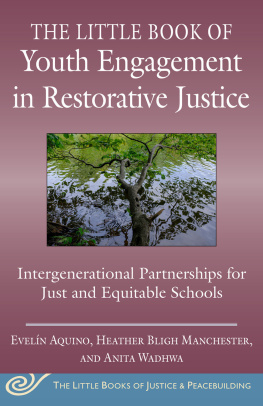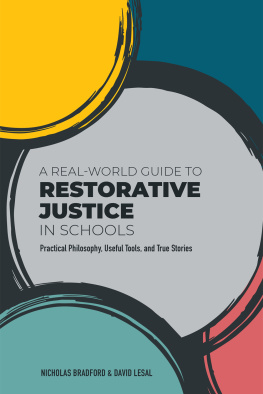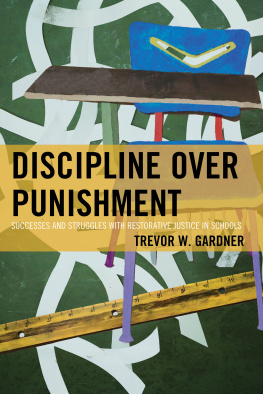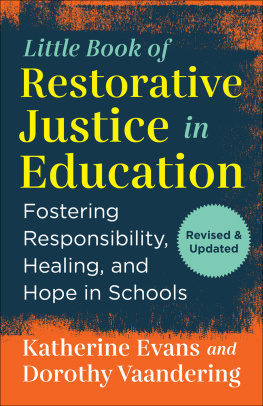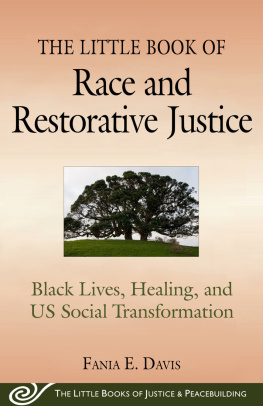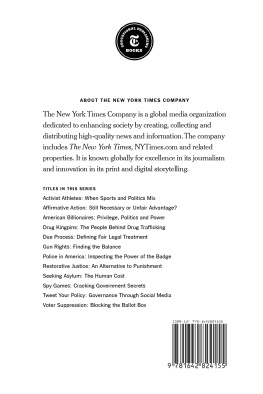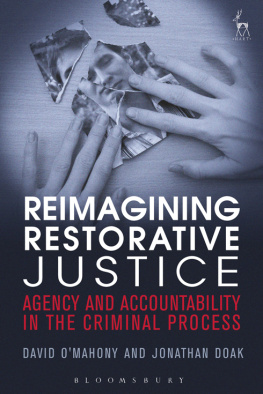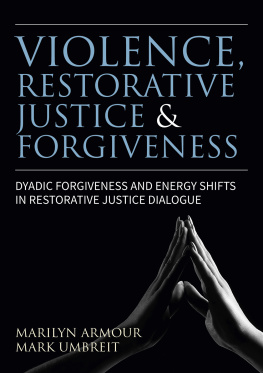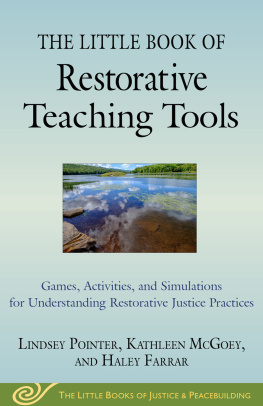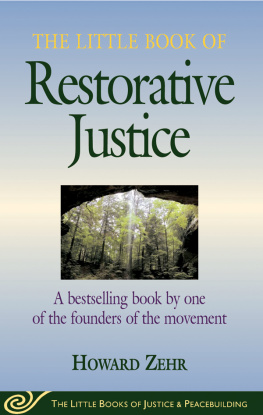


Copyright 2021 by Eveln Aquino, Heather Bligh Manchester, and Anita Wadhwa
All rights reserved. No part of this book may be reproduced in any manner without the express written consent of the publisher, except in the case of brief excerpts in critical reviews or articles. All inquiries should be addressed to Good Books, 307 West 36th Street, 11th Floor, New York, NY 10018.
Good Books books may be purchased in bulk at special discounts for sales promotion, corporate gifts, fund-raising, or educational purposes. Special editions can also be created to specifications. For details, contact the Special Sales Department, Good Books, 207 West 36th Street, 11th Floor, New York, NY 10018 or .
Good Books is an imprint of Skyhorse Publishing, Inc., a Delaware corporation.
Visit our website at www.goodbooks.com
10 9 8 7 6 5 4 3 2 1
Library of Congress Cataloging-in-Publication Data is available on file.
Series editor: Barbara Toews
Cover photograph: Howard Zehr
Print ISBN: 978-1-68099-748-4
eBook ISBN: 978-1-68099-770-5
Printed in the United States of America

Published titles include:
The Little Book of Restorative Justice: Revised & Updated, by Howard Zehr
The Little Book of Conflict Transformation, by John Paul Lederach
The Little Book of Family Group Conferences, New-Zealand Style, by Allan MacRae and Howard Zehr
The Little Book of Strategic Peacebuilding, by Lisa Schirch
The Little Book of Strategic Negotiation, by Jayne Seminare Docherty
The Little Book of Circle Processes, by Kay Pranis
The Little Book of Contemplative Photography, by Howard Zehr
The Little Book of Restorative Discipline for Schools, by Lorraine Stutzman Amstutz and Judy H. Mullet
The Little Book of Trauma Healing, by Carolyn Yoder
The Little Book of Biblical Justice, by Chris Marshall
The Little Book of Restorative Justice for People in Prison, by Barb Toews
The Little Book of Cool Tools for Hot Topics, by Ron Kraybill and Evelyn Wright
El Pequeo Libro de Justicia Restaurativa, by Howard Zehr
The Little Book of Dialogue for Difficult Subjects, by Lisa Schirch and David Campt
The Little Book of Victim Offender Conferencing, by Lorraine Stutzman Amstutz
The Little Book of Restorative Justice for Colleges and Universities, by David R. Karp
The Little Book of Restorative Justice for Sexual Abuse, by Judah Oudshoorn with Michelle Jackett and Lorraine Stutzman Amstutz
The Big Book of Restorative Justice: Four Classic Justice & Peacebuilding Books in One Volume, by Howard Zehr, Lorraine Stutzman Amstutz, Allan MacRae, and Kay Pranis
The Little Book of Transformative Community Conferencing, by David Anderson Hooker
The Little Book of Restorative Justice in Education, by Katherine Evans and Dorothy Vaandering
The Little Book of Restorative Justice for Older Adults, by Julie Friesen and Wendy Meek
The Little Book of Race and Restorative Justice, by Fania E. Davis
The Little Book of Racial Healing, by Thomas Norman DeWolf, Jodie Geddes
The Little Book of Restorative Teaching Tools, by Lindsey Pointer, Kathleen McGoey, and Haley Farrar
The Little Book of Police Youth Dialogue by Dr. Micah E. Johnson and Jeffrey Weisberg
The Little Books of Justice & Peacebuilding present, in highly accessible form, key concepts and practices from the fields of restorative justice, conflict transformation, and peacebuilding. Written by leaders in these fields, they are designed for practitioners, students, and anyone interested in justice, peace, and conflict resolution.
The Little Books of Justice & Peacebuilding series is a cooperative effort between the Center for Justice and Peacebuilding of Eastern Mennonite University and publisher Good Books.
Contents
Introduction
Theres no such thing as neutral education. Education either functions as an instrument to bring about conformity or freedom.
Paolo Freire
T his book is a call to action for restorative justice practitioners committed to building just and equitable schools in partnership with youth, families, and community. Just as there is no neutral education, there is no neutral restorative justice; solely focusing on healing interpersonal conflicts in schools through restorative justice does not acknowledge the legacy of harm in our educational system. Rooted in the wisdom of ancestral and Indigenous cultures, restorative justice (RJ) is a way of being and a philosophy grounded in community building, healing, and justice that has grown into a movement to transform schools and society.
The goal of restorative justice in education is creating just and equitable learning environments, nurturing healthy relationships, and repairing harm and transforming conflict. In this book, we push the field to go beyond transforming conflict to transforming the entire education system. Intergenerational partnerships, where all members of school communities collaborate with each other to create just and equitable learning environments, are at the root of this work.
Young people across the country are organizing for equitable education and RJ in schools, garnering wins through the elimination of punitive school discipline, the implementation of restorative justice, and the incorporation of Ethnic Studies into the curriculum. The purpose of this book is to illuminate a theory and practice of youth engagement in restorative justice through intergenerational partnerships where young people are agents of change.
Inequity in Schools
Restorative justice in schools addresses interpersonal harm but often fails to address larger systemic harms that result from institutional and structural injustice. Institutional injustice in schools occurs at a high level and includes policies and practices that harm people of color, students with disabilities, and those who identify as part of the LGBTQ+ community. For example, high-stakes testing companies continue to make billions of dollars to simply reinforce, and not remove, academic opportunity gaps for students of color. School closures funnel students from one low-performing school to another, and do not address root causes of socioeconomic inequity. Meanwhile, legislators nationwide have pushed to ban Ethnic Studies, an interdisciplinary field that honors the cultural and historical narratives of people who have been pushed to the margins and critically analyzes inequities to promote social change. Structural racism includes larger societal forces that reinforce inequality for people of color, including redlining, the disparate criminalization of people caught with marijuana vs. cannabis entrepreneurs, and a health care system based on profit.
Next page
